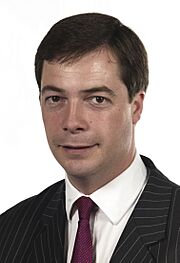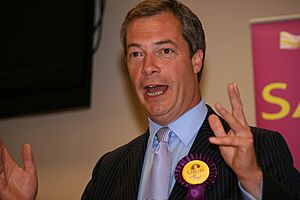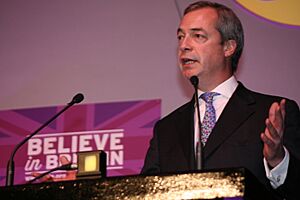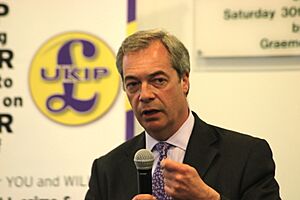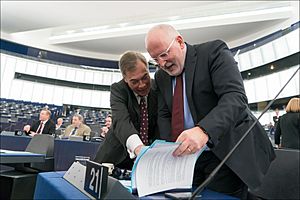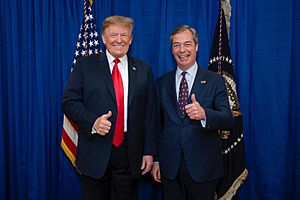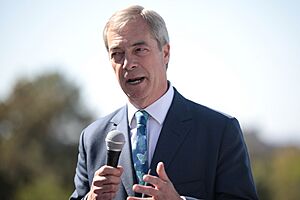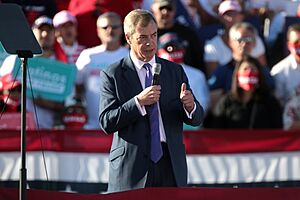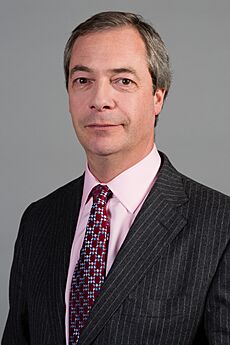Nigel Farage facts for kids
Quick facts for kids
Nigel Farage
|
|||||||||||||||||||||||||||||||||||||||||||||||||||||||||||||||||||||||||
|---|---|---|---|---|---|---|---|---|---|---|---|---|---|---|---|---|---|---|---|---|---|---|---|---|---|---|---|---|---|---|---|---|---|---|---|---|---|---|---|---|---|---|---|---|---|---|---|---|---|---|---|---|---|---|---|---|---|---|---|---|---|---|---|---|---|---|---|---|---|---|---|---|---|
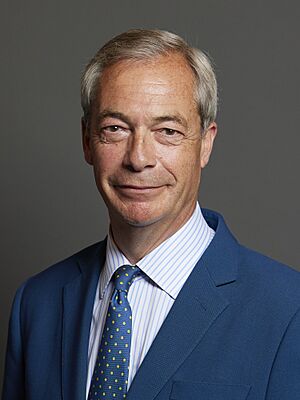
Official portrait, 2024
|
|||||||||||||||||||||||||||||||||||||||||||||||||||||||||||||||||||||||||
| Leader of Reform UK | |||||||||||||||||||||||||||||||||||||||||||||||||||||||||||||||||||||||||
| Assumed office 3 June 2024 |
|||||||||||||||||||||||||||||||||||||||||||||||||||||||||||||||||||||||||
| Deputy | David Bull and Ben Habib Richard Tice |
||||||||||||||||||||||||||||||||||||||||||||||||||||||||||||||||||||||||
| Preceded by | Richard Tice | ||||||||||||||||||||||||||||||||||||||||||||||||||||||||||||||||||||||||
|
|||||||||||||||||||||||||||||||||||||||||||||||||||||||||||||||||||||||||
| Member of Parliament for Clacton |
|||||||||||||||||||||||||||||||||||||||||||||||||||||||||||||||||||||||||
| Assumed office 4 July 2024 |
|||||||||||||||||||||||||||||||||||||||||||||||||||||||||||||||||||||||||
| Preceded by | Giles Watling | ||||||||||||||||||||||||||||||||||||||||||||||||||||||||||||||||||||||||
| Majority | 8,405 (18.3%) | ||||||||||||||||||||||||||||||||||||||||||||||||||||||||||||||||||||||||
| Member of the European Parliament for South East England |
|||||||||||||||||||||||||||||||||||||||||||||||||||||||||||||||||||||||||
| In office 10 June 1999 – 31 January 2020 |
|||||||||||||||||||||||||||||||||||||||||||||||||||||||||||||||||||||||||
| Preceded by | Constituency established | ||||||||||||||||||||||||||||||||||||||||||||||||||||||||||||||||||||||||
| Succeeded by | Constituency abolished | ||||||||||||||||||||||||||||||||||||||||||||||||||||||||||||||||||||||||
| Personal details | |||||||||||||||||||||||||||||||||||||||||||||||||||||||||||||||||||||||||
| Born |
Nigel Paul Farage
3 April 1964 Farnborough, Kent, England |
||||||||||||||||||||||||||||||||||||||||||||||||||||||||||||||||||||||||
| Political party | Reform UK (since 2019) | ||||||||||||||||||||||||||||||||||||||||||||||||||||||||||||||||||||||||
| Other political affiliations |
|
||||||||||||||||||||||||||||||||||||||||||||||||||||||||||||||||||||||||
| Spouses |
|
||||||||||||||||||||||||||||||||||||||||||||||||||||||||||||||||||||||||
| Domestic partner | Laure Ferrari | ||||||||||||||||||||||||||||||||||||||||||||||||||||||||||||||||||||||||
| Children | 4 | ||||||||||||||||||||||||||||||||||||||||||||||||||||||||||||||||||||||||
| Education | Dulwich College | ||||||||||||||||||||||||||||||||||||||||||||||||||||||||||||||||||||||||
| Occupation |
|
||||||||||||||||||||||||||||||||||||||||||||||||||||||||||||||||||||||||
| Signature | |||||||||||||||||||||||||||||||||||||||||||||||||||||||||||||||||||||||||
Nigel Paul Farage (born 3 April 1964) is a British politician. He became a Member of Parliament (MP) for Clacton in 2024. He has also been the Leader of Reform UK since 2024, having led the party before from 2019 to 2021.
Before this, he was the leader of the UK Independence Party (UKIP) from 2006 to 2009 and again from 2010 to 2016. Farage also served as a member of the European Parliament (MEP) for South East England from 1999 until the UK left the European Union (EU) in 2020.
He has been a strong supporter of Britain leaving the EU since the early 1990s. He was first elected to the European Parliament (EP) in 1999. In 2004, he became the president of a group called Europe of Freedom and Direct Democracy. Under his leadership, UKIP gained many votes in European elections, which helped lead to the 2016 EU membership referendum.
After the UK voted to leave the EU, Farage stepped down as UKIP's leader. In 2018, he helped start the Brexit Party, which later became Reform UK. This party gained a lot of support from people who felt Brexit was taking too long. In 2024, Farage became the leader of Reform UK again and won the Clacton seat in the general election.
Farage is known for his unique style and strong opinions. He has been recognized as an influential figure in British politics.
Early Life and Education
Nigel Paul Farage was born on 3 April 1964 in Farnborough, Kent, England. His father worked in the City of London as a stockbroker.
Farage went to Greenhayes School for Boys and then to Dulwich College, a private school in south London, from 1975 to 1982. He was active in the Conservative Party even during his school days.
While at Dulwich College, there were some concerns about his views, but the school leaders did not agree with these concerns. Farage has always said that any claims he was involved in far-right politics are completely untrue.
Early Career and Political Beginnings
After leaving school in 1982, Farage started working in the City of London as a commodities trader. He worked for several brokerage firms over the years.
He joined the Conservative Party in 1978. However, he left the Conservatives in 1992 because he disagreed with Prime Minister John Major's government signing the Treaty on European Union at Maastricht. In 1992, Farage joined the Anti-Federalist League. The next year, in 1993, he was one of the people who helped create UKIP.
Work in the European Parliament
Farage was elected to the European Parliament in 1999. He was re-elected in 2004, 2009, and 2014. He led the UKIP group in the European Parliament and was a co-leader of a group called Europe of Freedom and Direct Democracy, which was against the EU. He was known as a very effective speaker in the Parliament.
In 2004, Farage raised questions in the European Parliament about Jacques Barrot, a French Commissioner-designate, regarding past issues. The Parliament's President asked him to take back his comments, but it was later confirmed that Barrot had received a suspended sentence that was later cleared.
Farage also questioned the European Commission about where its members spent their holidays. This led to a debate about transparency, especially after it was revealed that the President of the European Commission, José Manuel Barroso, had stayed on a billionaire's yacht. Farage helped gather support for a motion to question Barroso, who then appeared before Parliament.
In 2010, Farage strongly criticized Herman Van Rompuy, the first long-term President of the European Council, during a speech in the European Parliament. Farage questioned Van Rompuy's appointment and described him in very strong terms. The President of the European Parliament, Jerzy Buzek, said Farage's behavior was "inappropriate" and "insulting." Farage refused to apologize and had some of his daily allowance (expenses) taken away.
In 2014, Farage led UKIP to win the most votes in the UK during the European Parliament elections. This was a historic moment, as it was the first time a party other than Labour or the Conservatives had won the popular vote in a national election since 1906.
UK Independence Party (UKIP)
Leading UKIP
Farage was a founding member of UKIP in 1993. On 12 September 2006, he was elected leader of UKIP. He promised to make the party more disciplined and to increase its presence in local and national elections. He wanted to show that UKIP was not just focused on one issue.
In 2009, Farage stepped down as UKIP's leader to focus on becoming a Member of Parliament for Buckingham in the 2010 general election. He ran against John Bercow, who was the Speaker of the House of Commons. Farage did not win the seat.
Plane Accident
On 6 May 2010, the day of the election, Farage was in a small plane with a UKIP banner attached. The plane crashed. Farage was injured, breaking his sternum and ribs and puncturing his lung. An investigation found that the banner got caught in the plane's tail, causing it to crash.
Return to Leadership
Farage became UKIP leader again on 5 November 2010. In May 2013, UKIP had its best performance in local elections, winning many council seats. Farage called this a "real sea change in British politics."
In 2013, Farage faced protests during a press conference in Edinburgh. He was prevented from leaving by taxi and eventually had to be taken away in a police van.
Farage has spoken about his personal finances and tax matters. He has said that he hired a tax advisor for a trust, but decided not to use it. He has also commented on tax avoidance, saying that some legal forms are acceptable.
In October 2014, Farage said that people with certain severe medical conditions should not be allowed into the UK because public services could not handle the extra demand.
2015 General Election
In 2013, Farage announced he would run for MP again in the 2015 general election. He was chosen as the UKIP candidate for South Thanet.
He took part in televised debates with other party leaders. After the election, Farage did not win his seat in South Thanet, though he came in second place. He announced his resignation as UKIP leader, saying he was a "man of his word." However, the party's national executive committee rejected his resignation, and he continued to lead the party.
This led to some disagreements within the party, with some members criticizing his leadership style.
Brexit Campaign
2016 Referendum
Farage was a very important figure in the 2016 Brexit campaign, which resulted in the UK voting to leave the EU with 52% of the vote. He suggested that 23 June, the day of the vote, should become a national holiday called "Independence Day."
He supported both the "Vote Leave" and "Leave.EU" campaigns, which aimed to leave the EU. He believed they reached different groups of people.
After the Referendum
On 28 June 2016, Farage gave a speech in the European Parliament. He told the other MEPs that a failure to agree on a trade deal with the UK would be worse for the EU than for Britain. He also reminded them that they had laughed at him 17 years earlier when he said he wanted Britain to leave the EU, and now they were not laughing.
Farage resigned as leader of UKIP on 4 July 2016, saying he wanted his "life back." He stated that this resignation was final. Many people in politics commented on his departure, recognizing his significant role in the Brexit vote.
In 2016, Farage attended the Republican National Convention in the US and later met Donald Trump, who would become the US President. He spoke at a rally for Trump.
After a legal challenge regarding the process of leaving the EU, Farage appeared on a TV show with Gina Miller, who brought the challenge. Farage warned of strong public anger if Parliament tried to block Brexit.
In 2017, Farage announced he would not run in the 2017 general election. He felt he could better promote his vision of Brexit as a leader in the European Parliament.
Brexit Party and Reform UK
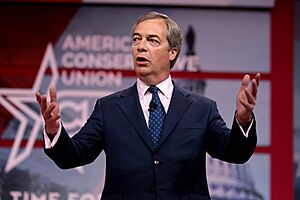
On 4 December 2018, Farage announced he was leaving UKIP after 25 years. He explained that he disagreed with the party's direction under its new leader, particularly regarding its focus on Islam.
In February 2019, the Brexit Party was approved. Farage said he would run as a candidate for this new party if there were future European Parliament elections in the UK. He became the new leader of the Brexit Party in March 2019.
In May 2019, a person threw a milkshake at Farage in Newcastle upon Tyne. The person was arrested and later pleaded guilty to assault and criminal damage. Farage commented that for a democracy to work, people must accept election results.
In June 2019, Donald Trump suggested that Farage should be involved in the UK government's Brexit negotiations.
In the 2019 European Parliament election, Farage led the Brexit Party to win the most seats and the highest share of the vote.
After Boris Johnson became prime minister, Farage announced candidates for the Brexit Party in the general election, but later decided not to stand himself. He suggested an electoral agreement with the Conservative Party to help secure Brexit, but the Conservatives declined.
In January 2020, Farage spoke to a crowd celebrating the UK's departure from the EU in Parliament Square. He said that this moment marked a "point of no return."
During the early stages of the COVID-19 pandemic in the United Kingdom in March 2020, Farage said that protecting people from the epidemic should be more important than the economy. In November 2020, he supported the Great Barrington Declaration, which suggested protecting vulnerable people while allowing others to live normally. He said lockdowns were "cruel and unnecessary."
In 2020, Farage started a financial newsletter called Fortune and Freedom. In July 2021, he criticized the Royal National Lifeboat Institution (RNLI) for its work with migrants. This led to a large increase in donations to the RNLI.
In May 2023, Farage told BBC Newsnight that Brexit had not brought the economic benefits he hoped for, blaming the policies of different Conservative governments. In September 2023, he was named the most influential person on the British right by the New Statesman.
Reform UK Leadership
The Reform UK party, which was renamed from the Brexit Party in 2021, is structured as a company. Farage owns most of the shares, giving him control.
On 6 March 2021, Farage announced he was stepping down as leader of Reform UK and retiring from politics. He became the party's honorary president, and Richard Tice took over as leader.
2024 General Election
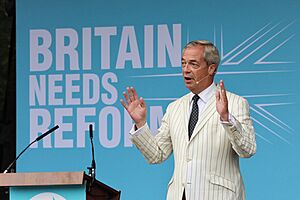
At a press conference on 3 June 2024, Farage announced he would become leader of Reform UK again and would run as a candidate in the Clacton constituency. He had previously said he would not stand in the election but changed his mind after people asked him to run.
On his first day of campaigning in Clacton-on-Sea, a drink was thrown at him. A woman was arrested. Farage later joked about the incident. On 12 June, another object was thrown at him while he was campaigning on a bus. He said he would not be intimidated and was later given private security.
Farage replaced another candidate for the Clacton seat. The previous candidate claimed he was not paid back for his campaign expenses and decided to run against Farage as an independent.
On 17 June, Farage and Tice launched Reform UK's "contract" with voters. It included promises to lower taxes, reduce immigration, increase funding for public services, and reform the NHS. They also pledged to change the House of Lords and the voting system. Reform UK is the only major party that opposes the current target for net zero carbon emissions.
In a BBC interview, Farage said Reform UK would lower taxes to encourage people to work. He also said he would remove university tuition fees for students studying science, technology, engineering, maths, and medicine. He stated his goal for Reform UK to replace the Conservatives as the main right-wing party.
On 4 July 2024, Farage won the Clacton seat, becoming an MP for the first time. Four other Reform UK candidates were also elected. Farage has now focused on winning seats against the governing Labour Party in future elections.
Member of Parliament
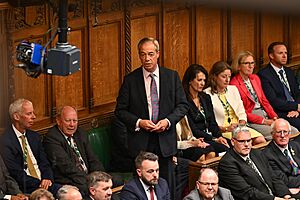
Following public disorder in July and August 2024, Farage condemned the events. He called for Parliament to discuss the situation.
In September 2024, Farage was in the process of buying a property in Clacton.
Leading up to the 2024 United States presidential election, Farage showed strong support for Donald Trump, meeting him at rallies and attending his election night party.
In December 2024, there were reports that businessman Elon Musk might donate a large sum to Reform UK. Farage called this "pure speculation" and said he had not heard anything about it. He later met Musk in Florida.
In January 2025, Farage and other Reform UK MPs voted for a new national inquiry into certain serious crimes, but the bill was not passed.
Support for Donald Trump
Farage is a strong supporter of Donald Trump. In October 2020, Farage spoke at a Trump rally in Arizona, praising Trump as a "resilient and brave person." He continued to support Trump in the 2024 US presidential election. After Trump faced legal issues in May 2024, Farage said he supported Trump "more than ever."
Broadcasting Career
Fox News
On 20 January 2017, Fox News, a US news channel, announced it had hired Farage as a commentator. He provides political analysis for Fox News and its sister channel, Fox Business Network.
LBC Radio
From January 2017 to June 2020, Farage hosted The Nigel Farage Show on the UK radio station LBC. The show was broadcast live in the evenings.
In 2019, Farage interviewed US President Donald Trump on his LBC show. Trump criticized Prime Minister Boris Johnson's Brexit deal at the time.
From March to July 2018, Farage also hosted a podcast called Farage Against The Machine. The podcast was later cancelled due to a disagreement over its name. On 11 June 2020, LBC announced that Farage would be leaving the station.
GB News
On 20 June 2021, Farage joined the British news channel GB News. He first hosted a Sunday morning political show and then began hosting an evening show called Farage from 19 July.
In August 2024, it was reported that Farage was earning a significant amount from his work on GB News, in addition to his salary as an MP.
I'm a Celebrity... Get Me Out of Here!
In November 2023, it was announced that Farage would appear on the reality TV show I'm a Celebrity...Get Me Out of Here!. Reports suggested he was offered a large fee to participate. Farage finished in third place on the show.
Personal Life
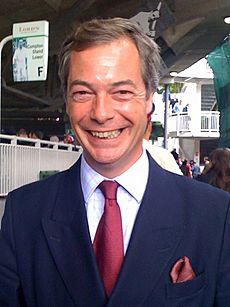
Farage lives in Single Street, a small area in the London Borough of Bromley.
He has been married twice and has four children. His first marriage was to Gráinne Hayes in 1988, and they divorced in 1997. In 1999, he married Kirsten Mehr, who is German. They have two children who have both British and German passports. In February 2017, his wife said they were living "separate lives." In 2023, it was reported that Farage was in a relationship with French politician Laure Ferrari.
In 1985, Farage was hit by a car and suffered injuries to his head and leg. The nurse who treated him later became his first wife.
Farage has written two books: Fighting Bull (also known as Flying Free) published in 2010, and The Purple Revolution: The Year That Changed Everything in 2015.
He is a big fan of cricket and association football, supporting Crystal Palace FC. He also enjoys fishing. Farage is known for smoking and enjoying beer, which are part of his public image. He is a member of the East India Club, a private club in London.
Farage is a Christian and has described himself as a "somewhat lapsed" member of the Church of England.
In January 2016, Farage said he believed his car had been tampered with in October 2015 when his wheel nuts came loose. He reported it to the French police, but later said he made a "terrible mistake" talking to journalists about it.
As of May 2025, Farage owns several properties, including a house in Kent and two houses in Lydd-on-Sea.
Coutts Bank Account
In June 2023, Farage said that his bank account with the private bank Coutts was being closed. He was offered a standard account by Coutts's parent company, NatWest. Farage said he was then refused accounts at several other UK banks.
It was later revealed that Coutts closed his account partly because they felt his beliefs did not align with their values. An internal document from Coutts described him in negative terms. The CEO of Coutts, Dame Alison Rose, faced criticism for how information about the account closure was handled.
In October 2023, an investigation found that NatWest had acted "lawfully" but "failed to treat him fairly" when closing his account. Farage called this report a "whitewash."
Awards and Recognition
In February 2020, Farage received an honorary doctorate degree from Liberty University in the US for his role in Brexit and his support for freedom.
In June 2023, he won the award for Best Presenter at the annual TRIC Awards.
See also
- Political positions of Nigel Farage
- Electoral history of Nigel Farage
- Brexit: The Uncivil War, a 2019 film where Nigel Farage is played by Paul Ryan
- The Farage Garage, a nickname for a customs facility near Dover
 | Emma Amos |
 | Edward Mitchell Bannister |
 | Larry D. Alexander |
 | Ernie Barnes |


